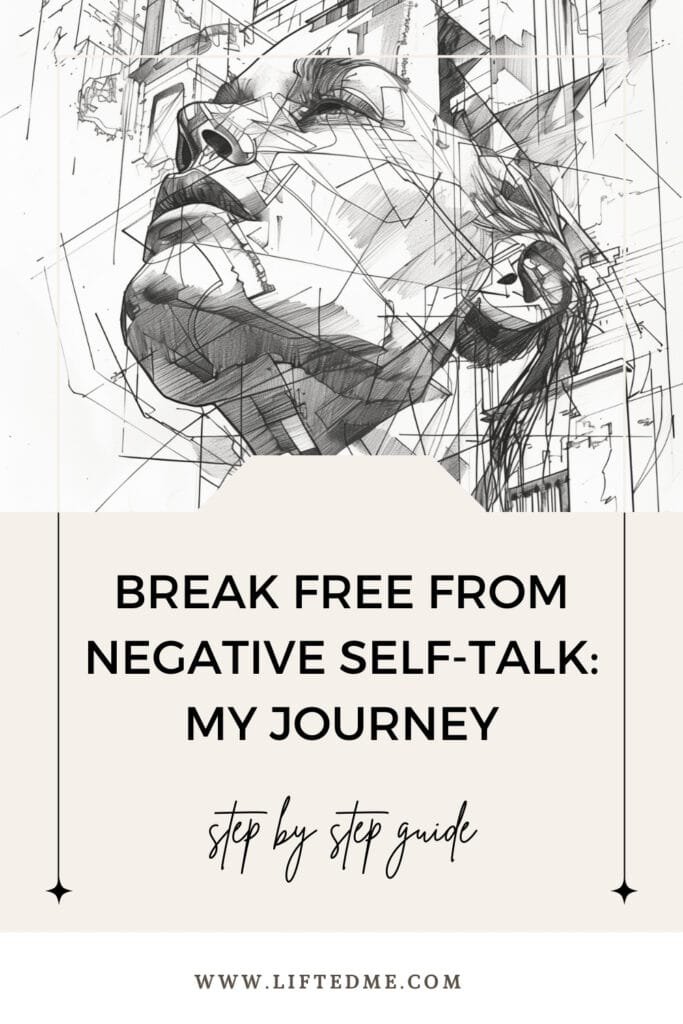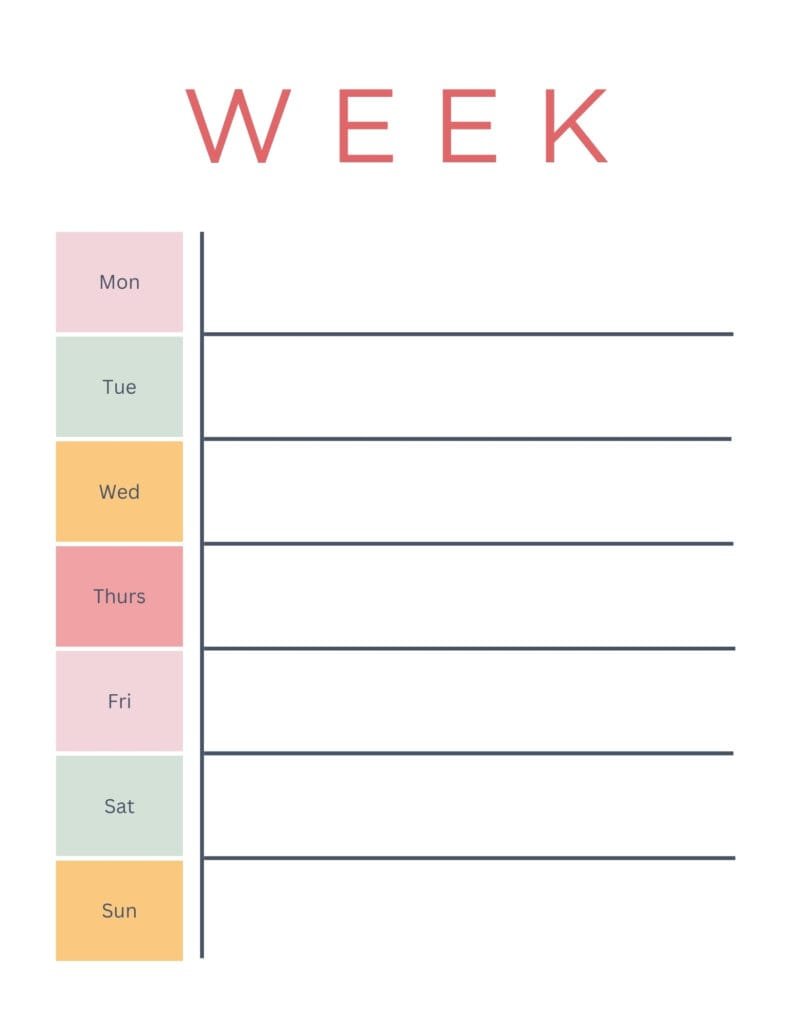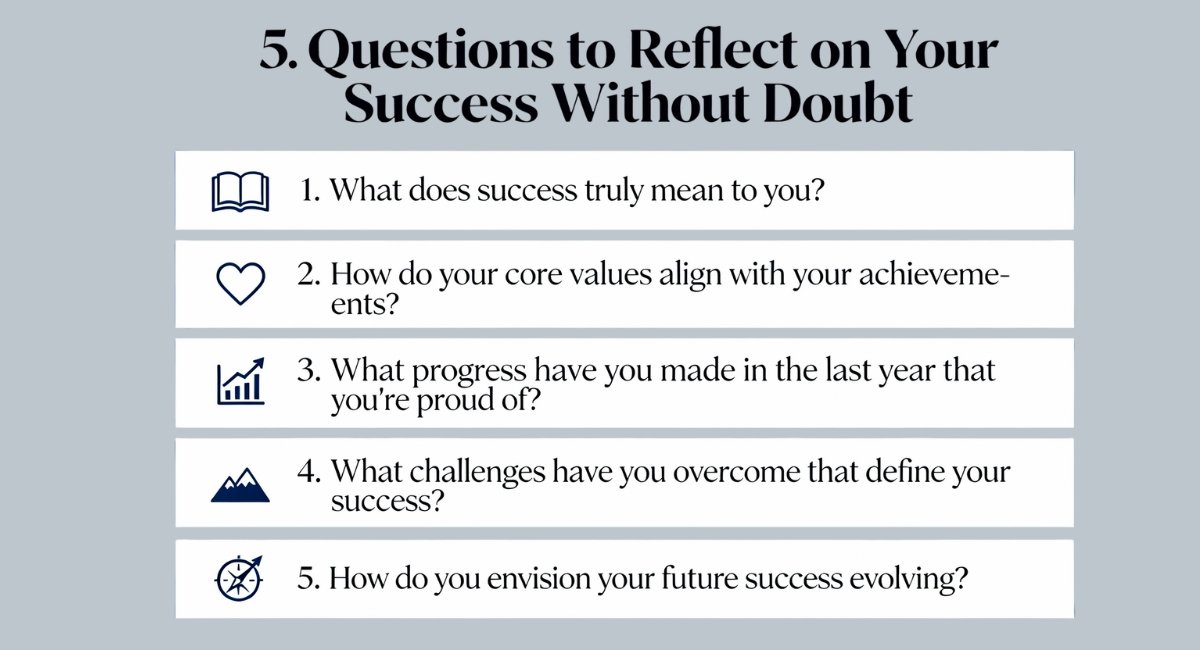Break Free from Negative Self-Talk: My Journey
This post contains paid and/or affiliate links. I make a small commission at no extra cost to you. Please see our Privacy Policy.
Have you ever found yourself lost in a whirlwind of self-criticism? If so, you’re not alone. Many of us face negative self-talk without realizing its impact on our mental health.
But what if the key to unlocking your potential is to face and beat this inner voice?
Learned how to overcome negative self-talk. Join me as we explore how to silence the inner critic and embrace self-compassion. Together, we’ll discover strategies for a life filled with resilience, self-acceptance, and fulfillment.

Shop Line Journal Books https://liftedme.com/product-category/journals-notebooks/
The Invisible Battle: Acknowledging the Negative Self-Talk
Have you ever felt trapped in a cycle of negative self-talk? It’s like a silent battle where guilt and self-judgment take over. Many people know this feeling well.
Constantly criticizing ourselves can make us feel drained, doubtful, and overwhelmed.
From Guilt to Self-Judgment: How Negative Self-Talk Arises
It often begins with guilt, a nagging feeling that we haven’t done enough. This guilt grows, making us replay every moment we could have done better.
Past achievements that once made us proud now seem like luck, and we feel like imposters.
Then, self-judgment hits, bringing overwhelming feelings. We start to criticize ourselves harshly, attacking every move we make. This cycle drains us, making it hard to face the day.

The Toll on Mental Health: Drowning in a Sea of Stormy Waves
This negative self-talk affects our mental health and emotional well-being. Activities we once enjoyed lose their joy. Work and personal life suffer as we struggle with self-criticism and self-pity.
Thinking about the future becomes hard, filled with rigid beliefs that we’ll fail. Anxiety grows, making us feel like we’re drowning in a sea of challenges.
Key Takeaways
- Recognize the subtle ways negative self-talk can manifest, such as harsh judgments and negative comparisons.
- Understand the importance of identifying negative thought patterns to initiate meaningful change.
- Learn how to reframe negative thoughts into more positive and objective statements.
- Discover the power of self-compassion and its role in overcoming the inner critic.
- Explore strategies to regulate unhealthy habits and redirect attention towards constructive solutions.
“The constant judgment of my behavior and emotions leaves me drained, a feeling many may recognize in their journey.”
The fight against negative self-talk is quiet but crucial. Acknowledging its power and impact on our mental health is the first step to freedom and inner peace.

Breaking the Silence: Recognizing the Power to Change
Amidst the noise of negative self-talk, a glimmer of hope emerges. Haruki Murakami’s words, “Pain is inevitable, suffering is optional,” echoed through my mind.
They sparked a realization that true power lies in our ability to shape our response to life’s challenges.
It was in the aftermath of a tough time that I saw a chance to break free from self-judgment. I decided to embrace the power to change.
Reflecting on the situation, I realized I couldn’t control getting sick. But, I could control how I reacted to it afterward. I had hurt myself more with my thoughts than the illness itself. That’s when I made up my mind to stop the negative talks with myself.
After all, our relationship with ourselves is the most important one. It’s this bond that helps us grow and become more aware of our feelings.
“The relationship we have with ourselves is the closest and most influential one in our lives. By forming a healthy bond with ourselves, we unlock the power to change and embrace the limitless possibilities that await.”
I knew I had to start working on this relationship with myself. It was time to stop criticizing myself and start being kinder. This journey of self-reflection and emotional awareness would be hard, but the benefits were worth it.
Starting this journey, I found that the key to breaking the silence of negative self-talk is being willing to see it and know we can change.
By facing our inner critic, we open up to new possibilities. Here, self-compassion and positive self-talk can grow.

Overcoming and Healing: Strategies to Silence the Inner Critic
Changing negative self-talk is hard, but it’s doable. You can take back your inner voice and be kinder to yourself. Start by understanding and being kind to yourself.
Learning Self-Compassion: Embracing the Human in Me
I used to believe in empathy, but I didn’t show it to myself. Now, I’m learning to accept my flaws and see life’s ups and downs.
When negative thoughts come, I pause and think about where they come from.
Understanding the reasons behind these thoughts helps me. It could be wanting to be perfect or feeling like an imposter. This insight lets me turn those thoughts into positive affirmations.

Questioning the Negative Talk: Understanding the Deeper Emotions
Negative self-talk can lead to mental health issues like depression. It comes from feeling pressured by society and fearing we’re not good enough. By looking into why we talk down to ourselves, we can tackle the real feelings driving it.
Practices like soothing breathing can help reduce stress and anxiety. Being kind to ourselves also makes us kinder to others. This creates a caring circle that helps us all feel supported.
“Self-compassion is about turning towards suffering, acknowledging and addressing pain at its source, treating oneself with understanding and care.”
Being kind to ourselves helps our mental health. It means knowing what triggers our negative thoughts and feelings. It’s about seeing our pain with kindness instead of judgment.
To fight negative self-talk, we need to support ourselves. This means learning to see our pain with compassion. Training ourselves to be supportive helps us handle vulnerability and stay positive.

Regulating the Habits that Cause Negative Feelings
Recognizing unhealthy patterns helps me understand how they make me feel not good enough. Breaking these patterns can silence the false stories I tell myself.
I’ve learned to notice when my mind starts to overthink and talk negatively about myself.
Breaking Unhealthy Patterns: Redirecting Attention and Reframing Perspectives
When I notice self-critical thoughts, I try to focus on positive things. This might mean working, reading an inspiring book, or talking with a friend. Stopping negative thoughts helps me break patterns that hold me back.
Cognitive reframing has been useful for me. I used to always compare myself to others, which made me feel disappointed and frustrated. Now, I tell myself that my journey is unique. It’s not fair to compare myself to others because we all face different challenges and successes.
Through mindfulness and focusing on perspective-taking, I’m learning to let go of perfection. I’m embracing my self-improvement journey. By managing my habits, I can stop negative thoughts and build a kinder inner dialogue.
“My journey and experiences are unique. It is unfair to keep comparing it with others.”
Self-acceptance is hard, but being aware of my thoughts and changing them helps. I’m finding the strength to quiet my inner critic and accept who I am.

Shifting Focus to Possibilities: Exploring Constructive Solutions
Instead of criticizing myself, I now ask, “What can I do now?”. This positive mindset helps me think positively and find ways to solve problems. When I’m not feeling well, I accept that I’m sick and can’t work as much.
Then, I look for things I can do to help myself. I might take a nap, eat something comforting, or read a book. These self-care actions make me feel better.
It’s hard to change how we see ourselves, especially when we’re vulnerable. But being kind to ourselves is important. Our flaws make us human, and accepting this can change how we see ourselves.
By being resilient and positive, we can face challenges with hope and purpose. When things get tough, it’s easy to feel down. But changing how I think can help a lot.
Instead of focusing on the negative, I ask, “What can I do to move forward?” This helps me find ways to solve problems and take care of myself.

FAQ
What was the turning point that made you realize the need to challenge your negative self-talk?
After a tough incident, Haruki Murakami’s words “Pain is inevitable, suffering is optional” stuck with me. I thought about how resting on myself instead of judging could have helped. This made me decide to fight the bad talks I have with myself.
How did you start developing self-compassion and acceptance?
I always believed in empathy, but I rarely used it on myself. Now, I’m learning to be kind to myself. I see that life is full of mistakes, and I don’t have to beat myself up over them.
What strategies did you use to break free from the cycle of negative self-talk?
When negative thoughts come, I look at where they come from and why I’m hard on myself. This helps me understand my feelings better. I’ve also seen that some patterns make me feel not good enough. Breaking these patterns stops the bad stories I tell myself.
How do you reframe your perspective and focus on constructive solutions?
Instead of beating myself up, I ask, “What can I do now?”. This helps me look for positive ways to solve problems. I take a moment, accept things as they are, and think about what I can do to improve the situation.
What advice would you give to someone struggling with negative self-talk?
Fighting our negative thoughts is hard, but being kind to ourselves can change a lot. Our flaws make us human, not weak. Accepting this can help us change how we see ourselves.



